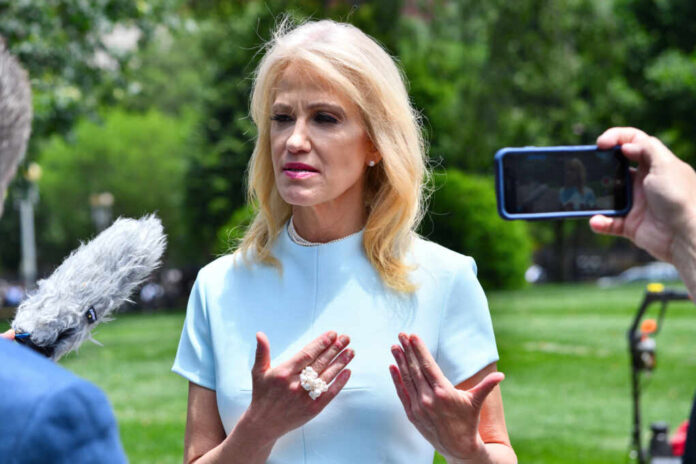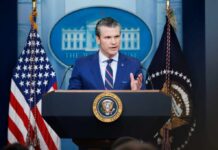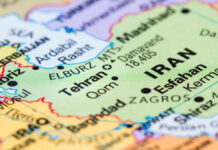
Former Trump advisor Kellyanne Conway claims Democrats face a stark choice between supporting America or China as Trump’s tariff policies drive economic growth and job creation.
At a Glance
- Conway asserts Trump’s increased tariffs on Chinese goods to 125% while suspending tariffs for most other nations is creating an economic ‘boom’
- Trump’s trade policies have reportedly triggered a surge in U.S. investments and new job announcements
- Conway argues Democrats have failed to present a viable alternative to Trump’s trade strategy
- She criticizes former President Obama for contradicting Trump’s policies while having failed to address China trade issues during his administration
Trump’s Tariff Strategy Creating Economic ‘Boom’
According to Kellyanne Conway, former senior counselor to President Donald Trump, the administration’s aggressive trade and tariff policies targeting China are driving significant economic growth. On Fox News’ “The Story,” Conway highlighted Trump’s decision to raise tariffs on Chinese goods to 125% while suspending them for most other nations. She contends this targeted approach is already showing positive results for the American economy in the form of new investments and job creation across the country.
Conway emphasized the visible impact of these policies on corporate behavior, noting a wave of companies approaching the White House with plans for domestic expansion. “So many corporations are hightailing it to 1600 [Pennsylvania Avenue] and saying ‘Hey, Mr. President, we’re opening up a new facility in North Carolina. We’re going to invest $20 billion in Americans and hire 5,000 new Americans in rural America over the next four or five years. And the White House is highlighting these success stories,” Conway stated.
Democrats’ China Dilemma
Conway suggests Democrats face a significant political challenge in responding to Trump’s trade policies. She frames their dilemma as a binary choice between supporting American interests or Chinese interests. “It’s called respect and fear. And I think this last election shows that Americans want strength over weakness, Liz, and they want fairness over unfairness. And what President Trump is doing and demonstrating with his trade and tariff agenda, with the Tax Cut and Jobs Act, the energy dominance, the smaller government footprint, whatever that ends up looking like, all that needs to be priced into this tariff and trade strategy as well,” Conway explained.
According to Conway, Democrats have yet to present a coherent alternative to Trump’s trade approach, particularly regarding China. She points to polling data suggesting strong public support for the tariff strategy, claiming Americans recognize the benefits of a tougher stance on trade. Conway argues that voters understand the connection between tariffs and economic strength, placing Democrats in the difficult position of opposing policies that appear to be delivering tangible economic results.
Criticism of Obama’s Role
Conway took aim at former President Barack Obama for his critiques of Trump’s policies and his support for Democratic candidates. She highlighted what she sees as contradictions between Obama’s current statements and his administration’s record on China and trade. Conway questioned Obama’s credibility in advising on current policy given his previous approaches to similar challenges during his presidency.
“In the first 100 days of Donald Trump’s first term, former President Barack Obama, who failed to get Hillary Clinton his third term, felt the need to go and tell the Wall Street Journal in an interview what President Trump, what Americans should be doing. Isn’t that rich? He won’t even say it now, won’t agree with it,” Conway stated.
Conway’s comments reflect the ongoing debate over trade policy approaches, with Republicans generally supporting Trump’s use of tariffs as leverage against China and Democrats questioning the economic impact and effectiveness of such policies. The discussion highlights the central role trade policy is likely to play in upcoming political campaigns, with both parties attempting to position themselves as defenders of American economic interests in an increasingly complex global trade environment.

























